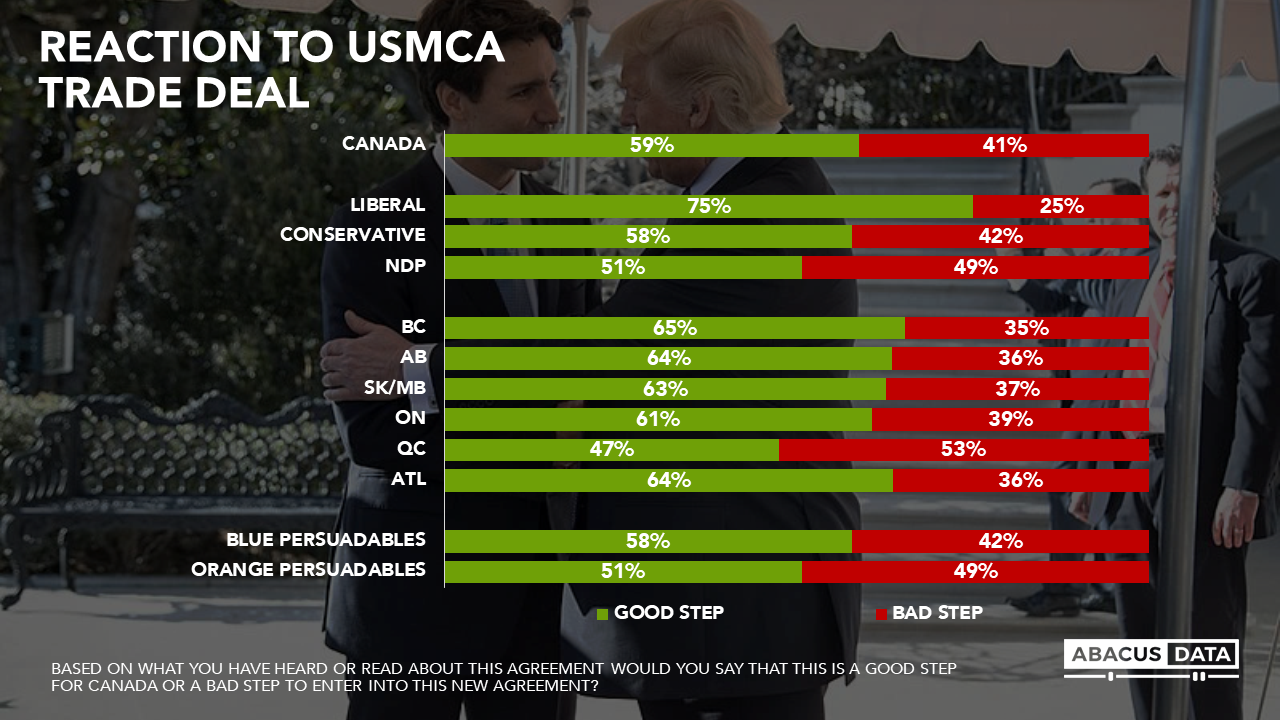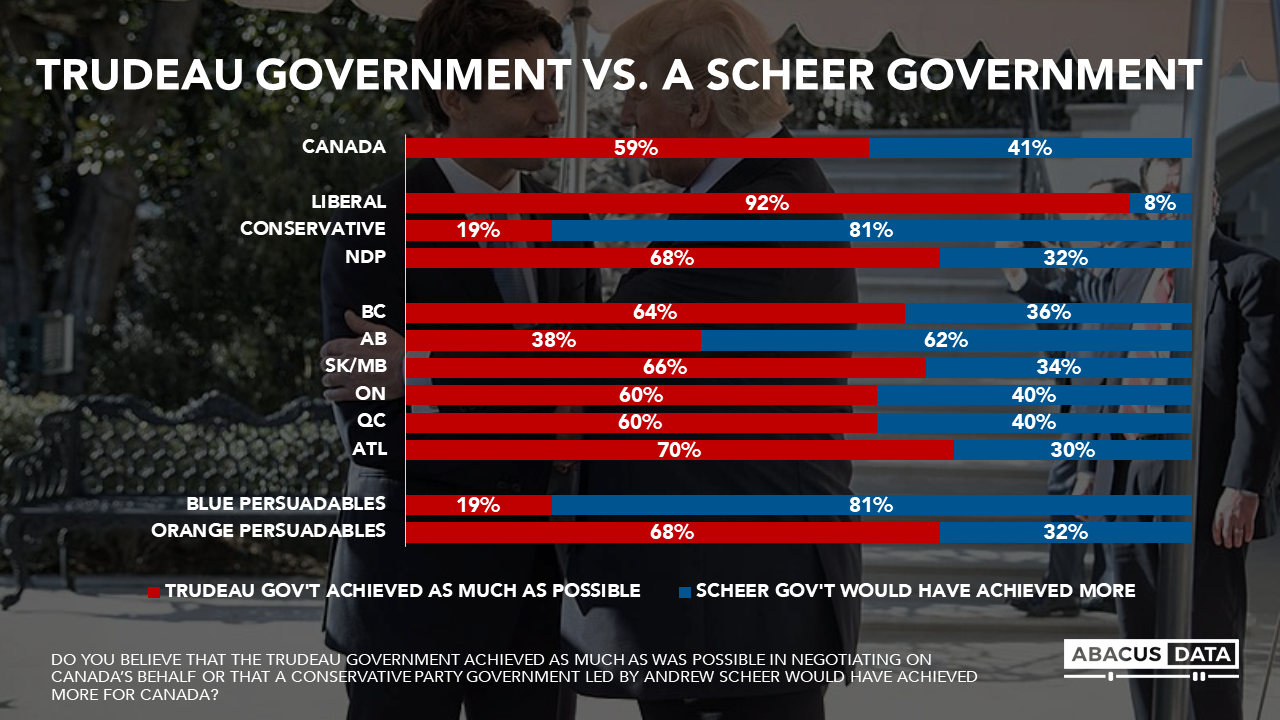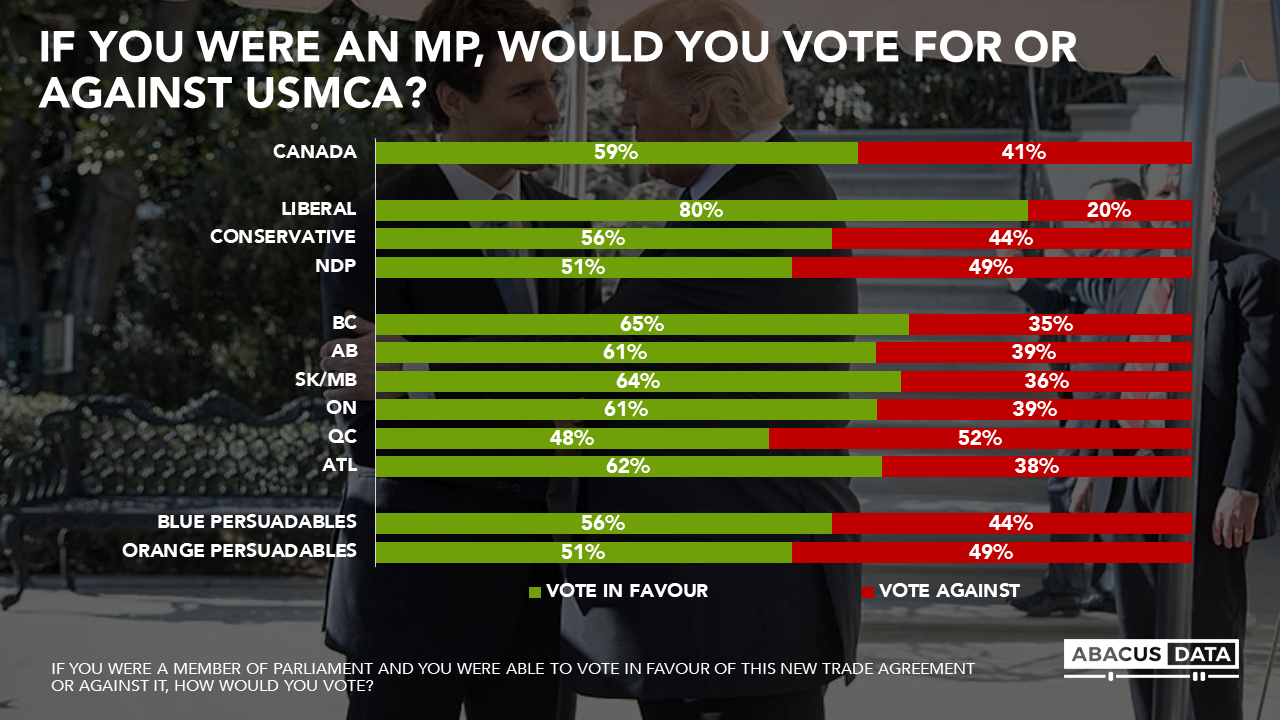Most Canadians would vote for the USMCA deal.
October 16, 2018
In our latest national survey, we asked several questions about the recently agreed to trilateral trade deal (USMCA) which is proposed to replace NAFTA.
Here is what we found:
Across the country, 59% believe that it was a “good step” for Canada to decide to enter this agreement, based on what they have heard or read about it, while 41% feel it was a bad step. Majorities of 61% or higher in every region say good step, except for Quebec, where 47% say good step and 53% feel it was a bad step.
Across partisan lines, the deal was welcomed by half of NDP voters, 59% of Conservatives and 75% of Liberal voters. Among Blue Persuadables, 58% say the deal was a good step while among Orange Persuadables, 51% feel that way.

(Blue Persuadables are those who are planning on voting Conservative but say the incumbent Liberals might be able to win their support in next year’s election. Orange Persuadables are those planning on voting NDP but who say they could be persuaded to support the Liberals)
Most people (59%) feel that the “Trudeau government achieved as much as was possible in negotiating on Canada’s behalf” while 41% believe “a Conservative government led by Andrew Scheer could have achieved more for Canada.” The belief that the Trudeau government got the best deal possible is 60% or higher in every region except for Alberta, where it drops to 38%. Across party lines, 92% of Liberals say the government got the best deal possible, 68% of New Democrats and 19% of Conservatives.

When asked if they were a Member of Parliament whether they would vote for or against the deal, 59% said they would vote in favour, 41% opposed, with support 61% or higher in every region but Quebec, where 48% would vote in favour and 52% opposed. Among NDP voters and Orange Persuadables 51% would vote yes on the deal. Among Conservatives and Blue Persuadables the proportions voting yes would be 55% and 56% respectively.

The issue of dairy market access played out prominently in the talks, and we asked the following question: “One of the things that Canada agreed to in the new USMCA was to let American dairy producers have more access to sell their dairy products to Canadian consumers. Canadian dairy farmers had opposed this. Which is closer to your view …I’m very opposed to any changes that allow the US more access to our dairy market…I think it’s a reasonable trade-off to allow the US more access to our dairy market in exchange for having a trade agreement…or I don’t have any feelings one way or the other about this.”
On this question, 43% expressed opposition to allowing more US producer access to Canada’s dairy market, while an almost equal number said they felt this was a reasonable trade-off while 18% have no clear views. Discomfort is 14 points higher in Quebec compared to the rest of the country.
Across party lines, 33% of Liberal voters are unhappy about that aspect of the deal, while 53% accept the trade-off and 16% have no real opinion. Conservative unhappiness with the impact on dairy registers at 42% while 60% of NDP voters are opposed to this aspect of the deal.

UPSHOT
When Canada first agreed to enter into a free trade agreement with the US, Canadians were anxious about the potential downsides and hesitant about whether it was a good idea.
With 30 years of experience of free trade, opinion has shifted and most Canadians indicate relief that a new deal has been reached, having wondered if that would be possible, given the uncertainty that has marked the trade relationships of the US, under President Donald Trump. Given that Liberal vote has been in the 33%-38% range lately, the fact that about 60% are supportive of this new deal indicates that the issue is at this point in time, a positive for Mr. Trudeau and his party.
There is evidence of some discomfort with the dairy provisions, especially in Quebec, and time will tell whether this becomes a larger or persistent source of unhappiness with the USMCA outcome.
So far, at least, the USMCA deal is not a situation where many voters think a Conservative government would have been able to accomplish more.
METHODOLOGY
Our survey was conducted online with 2,109 Canadians aged 18 and over from October 5 to 12, 2018. A random sample of panelists was invited to complete the survey from a set of partner panels based on the Lucid exchange platform. These partners are double opt-in survey panels, blended to manage out potential skews in the data from a single source.
The margin of error for a comparable probability-based random sample of the same size is +/- 2.2%, 19 times out of 20. The data were weighted according to census data to ensure that the sample matched Canada’s population according to age, gender, educational attainment, and region. Totals may not add up to 100 due to rounding.
ABOUT ABACUS DATA
We are the only research and strategy firm that helps organizations respond to the unprecedented threat of generational change and technological disruption.
We are an innovative, fast-growing public opinion and marketing research consultancy. We use the latest technology, sound science, and deep experience to generate top-flight research-based advice to our clients. We offer global research capacity with a strong focus on customer service, attention to detail and exceptional value.
Contact us with any questions.




